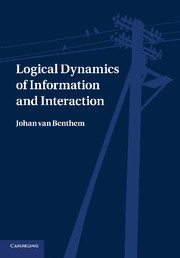Book contents
- Frontmatter
- Contents
- Preface
- Acknowledgments
- 1 Logical dynamics, agency, and intelligent interaction
- 2 Epistemic logic and semantic information
- 3 Dynamic logic of public observation
- 4 Multi-agent dynamic-epistemic logic
- 5 Dynamics of inference and awareness
- 6 Questions and issue management
- 7 Soft information, correction, and belief change
- 8 An encounter with probability
- 9 Preference statics and dynamics
- 10 Decisions, actions, and games
- 11 Processes over time
- 12 Epistemic group structure and collective agency
- 13 Logical dynamics in philosophy
- 14 Computation as conversation
- 15 Rational dynamics in game theory
- 16 Meeting cognitive realities
- 17 Conclusion
- References
- Index
8 - An encounter with probability
Published online by Cambridge University Press: 07 October 2011
- Frontmatter
- Contents
- Preface
- Acknowledgments
- 1 Logical dynamics, agency, and intelligent interaction
- 2 Epistemic logic and semantic information
- 3 Dynamic logic of public observation
- 4 Multi-agent dynamic-epistemic logic
- 5 Dynamics of inference and awareness
- 6 Questions and issue management
- 7 Soft information, correction, and belief change
- 8 An encounter with probability
- 9 Preference statics and dynamics
- 10 Decisions, actions, and games
- 11 Processes over time
- 12 Epistemic group structure and collective agency
- 13 Logical dynamics in philosophy
- 14 Computation as conversation
- 15 Rational dynamics in game theory
- 16 Meeting cognitive realities
- 17 Conclusion
- References
- Index
Summary
Our dynamic logics deal with agents’ knowledge and beliefs under information update. But update has long been the engine of probability theory, a major lifestyle in science and philosophy. This chapter is an intermezzo linking the two perspectives, without any pretence at completeness, and assuming the basics of probability theory without further ado. We will show how probability theory fits well with dynamic-epistemic logics, leading to a new update mechanism that merges three aspects: prior world probability, occurrence probability of events, and observation probability. The resulting logic can be axiomatized in our standard style, leading to interesting comparisons with probabilistic methods.
Probabilistic update
The absolute basics A probability spaceM= (W, X, P) is a set of worlds W with a family X of propositions that can be true or false at worlds, plus a probability measure P on propositions. This is like single-agent epistemic models, but with refined information on agent's views of propositions. In what follows, we use high-school basics: no σ–algebras, measurable sets, and all that. Intuitions come from finite probability spaces, putting each subset in X.
Information
- Type
- Chapter
- Information
- Logical Dynamics of Information and Interaction , pp. 156 - 173Publisher: Cambridge University PressPrint publication year: 2011
